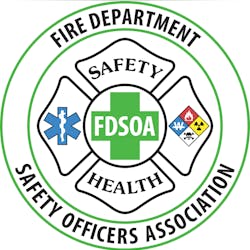FDSOA Symposium: Graham Lectures on True Risk Management
Source Firehouse.com News
SCOTTSDALE, Ariz. – As the Fire Department Safety Officers Association’s (FDSOA) apparatus symposium concluded, its annual safety forum opened with an overlap presentation by Gordon Graham, a long-time champion of public safety responders.
For more than three hours, Graham educated and entertained firefighters from all over the country with a simple, yet profound message focused on risk management and how firefighters can better protect themselves.
“If we can identify the cause of the tragedy, perhaps we can put together control measures to prevent similar tragedies from occurring,” Graham said.
Graham, who is also president of Lexipol, a company focused on standardizing policies, procedures and training within public safety agencies, said the importance of data cannot be overstated. Data and its analysis is key to developing sound risk management plans and policies.
“The truth is we don’t know jack about risk management,” he said of people who work for government public safety agencies. “We get all worked up about the wrong things.”
With humorous anecdotes, amusing impressions and self-deprecating observations, Graham drove home the fact that people too often focus on the obvious and superficial causes and risks rather than dig deeper into the issues.
Graham, who is also a former California Highway Patrol motorcycle officer, said people in his home state are all worked up about sharks and are afraid to go into the water for fear of a shark attack. With a litany of statistics, one of which was a beach-goer had more of a chance of dying from stepping on an infected hypodermic needle on the beach, which is extremely low, than they have from being mortally wounded in a shark attack.
He related a story about a one-on-one conversation he had with the then commander of the U.S. Marine Corps and how he asked a question about the biggest threat he faces.
“He said payday loans,” Graham said of the unexpected answer. Digging deeper, Graham learned that Marines get swept up in loans with ridiculously high interest rates that cause all kinds of financial and personal troubled for the enlisted.
“He was looking at the root cause for the problems,” Graham said. “Do you think my opinion of him went up 500 points? You bet it did. He gets it.”
Relating that to the fire service, Graham said too often investigations focus on just the immediate, or proximate causes without going deeper.
“Sadly, too many people have never been taught that a given tragedy will have multiple causes, including proximate cause, contributory cause, root causes and other problems lying in wait – that people knew about or should have known about and no one did anything about it,” Graham said.
Using one of the only tragedies known around the world, Graham talked about the sinking of the Titanic which killed 1,500 people.
“Everybody knows it was the iceberg that sank the Titanic, but was it the real cause,” Graham said. He said the proximate cause of the sinking was indeed the iceberg, but he pushed back in time for the root cause which may have the genesis with overzealous cruise line owners who built two ships at once bigger and faster than the world had ever seen previous with no regard for the availability of quality of steel and qualified labor.
Pulling it back to the fire service, Graham said that time and time again there’s a series of events that cause a line of duty death.
“Rarely is it a single event that causes a tragedy,” Graham said. “There is a proximate cause, or triggering event that causes the tragedy, but if you focus on just that, you are dooming yourself to the possibility of it happening again. Don’t stop at the proximate cause. …If you ignore a problem lying in wait, sooner or later all the holes in the Swiss cheese will line up.”
Using a hand out provided to the audience, Graham walked the attendees through seven rules of risk management.
- “You must have a rising standard of quality over time and well beyond what is required by any minimum standard.”
- “People running complex systems should be highly capable.”
- “Supervisors have to face bad news when it comes and take problems to a level high enough to fix those problems.
- "You must have a healthy respect for the dangers and risks of your particular job.”
- “Training must be constant and rigorous.”
- “You must have a robust audit process to assure that what you say you are doing you are, in fact doing.”
- “The organization and members thereof must have the ability and willingness to learn from mistakes of the past.
“Continual improvement has got to be the rule of life,” Graham said. “Status quo is gone. …You need to take this stuff back to your station and do something about it.”
More from FDSOA:
- FDSOA's Apparatus Symposium Opens in Ariz.
- FDSOA Symposium: Diesel Emissions Standards Need not be so Scary
- FDSOA Symposium: NFPA 2015 Apparatus Standards Reviewed
- FDSOA Symposium: Politics Play a Role in Apparatus Purchasing
- FDSOA Symposium: Experts Field Apparatus Questions
- FDSOA Symposium: Detroit FD Weathers City's Bankruptcy
- FDSOA Symposium: Apparatus Design Is Important for ISO Ratings
- FDSOA Symposium: Drones Can Be Valuable Tools For Responders
- FDSOA Symposium: NFPA Focused on Alternative Fuel Emergency Safety
- FDSOA Symposium: Graham Lectures on True Risk Managment
- FDSOA Symposium: Pros and Cons of Thermal Imagers Discussed
- FDSOA Symposium: Maintenance is Key to Keeping Apparatus on the Road






